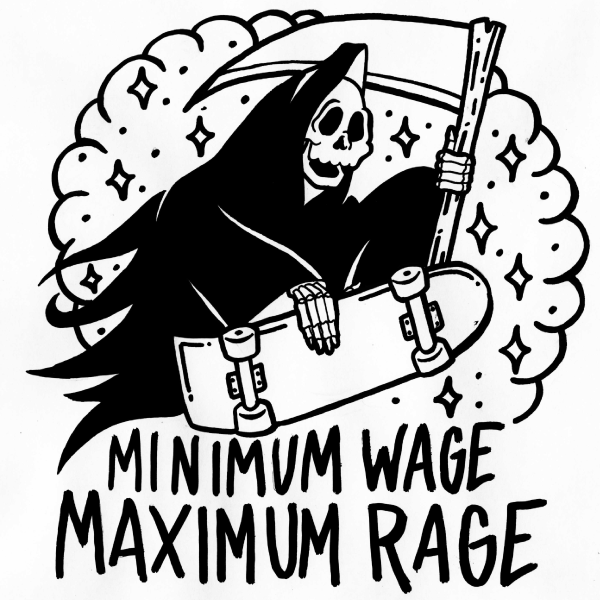The problem is the way the system is rigged.
Kroger is a publicly traded company, their stock price right now is 46.71 / share.
You can see their most recent earnings report here:
Operating Profit of $912 million; EPS of $0.88
Now then… for NEXT quarter… It doesn’t matter if they are profitable or not. Because they are publicly traded, they are going to be expected to make MORE profit than they did this quarter.
Let’s say next quarter they “only” have $890 million in profit… Most of us would KILL to be that profitable.
The stock market analysts will look at it and go “yeah, but you ‘lost’ $22 million from last quarter…” and they will punish Kroger for failing.
Even worse…
Let’s say Kroger raised their prices and pulls in a profit of $915 million next quarter… they can STILL get punished if the market goes “Yeah, but our analysts expected you to bring in $921 million in profit.”
Failing to meet or beat “expectations” is just as bad as raking in less of a profit than last time.
So prices go up, because they have to make more money than the same time last month, last quarter, last year.
abolish the stock market. put these hogs on a fucking island with no natural resources but sand and salt water. set up a camera and let us watch.
It’s interesting how recent the stock market really is:
https://www.sofi.com/learn/content/history-of-the-stock-market/
"The first modern stock trading market was created in Amsterdam when the Dutch East India Company was the first publicly traded company. To raise capital, the company decided to sell stock and pay dividends of the shares to investors. Then in 1611, the Amsterdam stock exchange was created. For many years, the only trading activity on the exchange was trading shares of the Dutch East India Company.
At this point, other countries began creating similar companies, and buying shares of stock was popular for investors. The excitement blinded most investors and they bought into any company that began available without investigating the organization. This resulted in financial instability, and eventually in 1720, investors became fearful and tried to sell all their shares in a hurry. No one was buying however, so the market crashed.
. . .
Although the first stock market began in Amsterdam in 1611, the U.S. didn’t get into the stock market game until the late 1700s. It was then that a small group of merchants made the Buttonwood Tree Agreement. This group of men met daily to buy and sell stocks and bonds, which became the origin of what we know today as the New York Stock Exchange (NYSE).
Although the Buttonwood traders are considered the inventors of the largest stock exchange in America, the Philadelphia Stock Exchange was America’s first stock exchange. Founded in 1790, the Philadelphia Stock Exchange had a profound impact on the city’s place in the global economy, including helping spur the development of the U.S.’s financial sectors and its expansion west."
I don’t know if my highschool education is failing me, but the US declared independence in 1776, so I feel like the US not having a stock market until the late 1700s makes a lot of sense.
That’s not the interesting part. The interesting part is that the Dutch East India Company was under a legal charter where they could make war with and enslave whoever they wanted to as a quasi-independent entity.
That’s what the stock market concept is based upon. Slavery and murder.
That’s what anything is based upon. Murder and the threat of it.*
I mean, that’s a bit unfair. The stock market is a concept that’s based on expected annual growth paid out in a steady return on investment. Slavery and murder just happen to be incredibly lucrative industries, such that you could confidently invest in firms like Dutch East India and expect more than you put in.
Pick up a copy of Picketty’s “Capitalism In the 21st Century” and you can see how this played out over the long term. Prior to Capitalist market mechanics, you’d have these feudal estates that would levy rents with a steady-state expectation of returns. You had 10,000 acres being worked by 100 farmers and they tithed you their surplus in food. You warehoused that food and traded it back to them for their labor, with which you built churches and castles and recruited soldiers for your next war. But the real economy was stagnant, outside fluctuations in population from plague or invasion or natural disaster.
Then you get this idea of cumulative return on investment, and there’s this sudden rapid expansion of commerce and capital that simply had no historical parallel. This didn’t need to be predicated on bloodshed or occupation. The textile industry boom in the UK, for instance, was this more-or-less bloodless conflagration of productive forces. Huge industrial looms turned a desperately scare resource into a cheap consumer commodity within a span of a few decades. And a big part of that was the feedback loop of investment -> capital production -> lucrative returns -> re-investment.
Similarly, the boom in agricultural productivity thanks to the advent of modern fertilizers has functionally ended natural famines. This was, incidentally, a knock on effect of the Loom Boom, as the first industrial fertilizers were derived from pesticides which were derived from clothing dyes.
The pain and suffering that followed the Dutch East India Company was not a consequence of the market mechanic nearly so much as it was the consequence of an aristocracy with no countervailing force among the proles. It was consistent with the behavior of lords and kings going back thousands of years, just industrialized.
Old enough to be the “tradition” of the united states of america, and thus never be legally challenged by the SC.
How old are you that 500 years is still recent?
Well, when you consider that humans go back 300,000 years or so, and “civilization”, such as it is, goes back 10,000 - 12,000 years, 500 years is really not much at all.
Anything in relation to humans can be called recent if you’re playing in those timelines.
The problem is that a bunch of the hogs are our retirement funds.
We need to remove the middle-men from the equation and institute guaranteed basic income before we can change it.
It did serve a purpose. But like all money and corporation things we’ve let the wealthy run away with it.
You should absolutely not abolish the stock market because it’s the single way most average people have to becoming wealthy. What you should do is change how it operates. Here’s a novel idea I’ve had for a long time.
Make more and more companies worker co-ops going forward by incentivizing them the attacks credits and local government health in getting them started. Preserve 75% of the company for the people who actually work there which is what makes it a worker’s co-op.
Reserve 25% of the company for speculation on Wall Street and to raise capital if they need to.
This way you can have sort of a socialist economy that avoids abuses and a stock market at the same time that provides liquidity and efficiency.
they can STILL get punished if the market goes “Yeah, but our analysts expected you to bring in $921 million in profit.”
This happened to the company I’m in. We had record profits, were positive for the first time in years, and beat our goals by a decent bit. Stock prices tanked anyway because “the best we’ve ever done” wasn’t good enough for the shareholders.
The “expectations” aspect became especially apparent when Tesla was valued higher than the next top 10 auto manufacturers combined.
It was literally that Tesla is new shit that we can bet on. It has nothing to do with Tesla’s actual value.
It’s also the issue with buying stocks based on a company’s performance. If you do that, you’re already too late because investors with more information have already bought based on a prediction of that performance (or insider information).
That was just people chasing fomo and the “greater fool”. Basically some people are dumb and don’t want to miss out. Other people know the company is crappy but think they can sell to a dummy at a higher price. Eventually people think “it’s different this time” and pay way too much money. Last dummies are left holding the bag.
Exactly what’s happening with Bitcoin and all other cryptocurrencies. There’s no value attached to the currency besides hype, which eventually fades. The USD is reliable because the US government only accepts it as payment for taxes. You need it. No one important accepts only Bitcoin. So you don’t need it.
No one important accepts only venmo, yet it is a popular platform for payments. Nobody outside of the US has to pay taxes to the US govt yet they still choose USD. The value of the currency come from the same things that bring value to all currencies: people’s faith in its monetary policy and network effect (how many places you can spend it). All currencies are speculated on by traders, this is not unique to Bitcoin.
Bitcoin has maintained it’s monetary policy in a stable state and worked 365 days a year, 24 hours a day for 15 years without a single day of downtime and without being hacked. And for reasons of math and physics, it will continue to do so. Nobody, no matter how powerful you are, can print Bitcoin that isn’t meant to be printed or spend money you don’t have the private key to.
With Bitcoin lightning, you can send a transaction across the globe in under a second with pennies in transaction fees. This can be accessed by anybody with a cell phone and halfway reliable internet access, regardless of whether they have access to stable banking infrastructure, which Billions of people, with a B, do not.
Bitcoin’s total market cap is over 800 billion which puts it in the top 25 countries by GDP. Higher than Sweden. Higher than Israel. Higher than Vietnam. On average, adoption and market cap grows every year no matter which metric you use to measure it.
Every day, every single block on the bitcoin blockchain is full of transactions. People pay for that space, there is no empty space left in any of the blocks. People are sending money from A to B with it. It secures those transactions. That is its use case and value.
It’s all so dumb. I’m sorry for the language, but it’s just really, really dang dumb. There, I said it.
Try working for a publicly traded company and having stock shares.
I had a decent chunk of stock. One quarter we failed to meet expectations by 0.23%. The stock price went down 30%. Grrr!
I worked for awhile at a private investment firm. Still can’t muster much more than it’s all so, so dumb.
The shit part is even with private companies if they’re run by a bunch of fucking idiot owners, they do not want to back off their bottom line, so they’ll just let people go vs having savings to weather a down turn. Very few of our companies that employee everyone are run by intelligent people… it’s mostly fucking idiots driving the ship like crack heads looking for their next fix.
You must have joined the work force in 2021. Stock drops like that are extremely not normal.
I always imagine the stockholder that trades off quarterly expectations to be someone sitting in an overly large home getting all bent out of shape because someone else’s labor didn’t make them enough money RIGHT NOW!
It isn’t one guy adjusting one portfolio relative to a single quarterly change in profits. You have to look at this as thousands of hedge funds with tens of billions of dollars in investor cash comparing Kroger to Safeway and Walmart and saying “I want 8% exposure to the cyclical consumer retail sector and I have $X-Billion to invest, how much of that do I want to distribute across these three companies?” And then if Kroger underperforms Safeway and Walmart, my algorithm tells me to sell Kroger stock and use the proceeds to buy up Safeway/Walmart.
This gives Safeway/Walmart a lower rate of effective borrowing, which means they can build new stores in territory adjacent to Kroger locations or expand into territory none of them dominate. It sets off a cascading effect in which Safeway gets to grow while Krogers treads water. Eventually, Safeway can start installing stores directly adjacent to Kroger and selling everything in this one storefront at 10% under cost-of-purchase until Krogers goes out of business from cut-rate competition. Then Safeway jacks up their prices at this one store and returns to rising profitability.
That’s the market mechanism in effect. Low lending rates mean you can drive your competitors out of business. So everyone needs to run a competitive profit margin in order to avoid getting swallowed up by their neighbors. And the folks who decide if you’re “competitive” are a handful of mega-investment banks that decide how much of your stock they’re going to buy.
And the folks who decide if you’re “competitive” are a handful of mega-investment banks that decide how much of your stock they’re going to buy.
This one statement says a lot about the American economy
And thank you for the explanation
deleted by creator
And disregarding those expectations can carry personal liability for anyone in a position to do it, because the executive leadership of the company has a legal responsibility to act in the interest of the shareholders above all else.
So like, I’m no stock broker, but if I understand right, a company doesn’t directly benefit in any way from a higher stock price, right? They could split it, but for the most part, once their shares are bought up, the only people benefiting from the stock are rando shareholders and the handful of employees with stock options.
The stock price determines the overall value of the company and has all kinds of ramifications, purchase ability, loan agreements, etc. etc.
Ah, I see. Interesting.
Adding to this:
Executives are often paid in stock so they’re invested in seeing the price go up.
A corporation’s board of directors (who lead the company and can fire/hire executives) are also paid in stock or have very large stock holdings already.
All the people at the top benefit from seeing that stock price go higher. They care more about stock price than whether or not customers are happy, or if they’re doing right by their employees.
As someone that has worked on Wall Street as a professional trader I can agree with what you’re saying and I agree that it needs to change. We need to get rid of this idea of endless growth. It’s just not reasonable to expect that from every industry considering that industries have cycles and eventually they mature.
You hit a point of maximum (Pareto) efficiency where people are actually driving the most possible benefit from a business and there’s a good healthy return financially. And then businesses feel the need to overshoot that and water down the quality of the product until people stop buying it entirely.
Then they just blame changing consumer demand rather than taking responsibility.
It’s a real problem and it’s going to impact our lives going forward much more aggressively as corporations win the culture war.
I remember back in the day Exxon set some kind of quarterly record, not just for them but for ANY company. Everyone was going “Wooo!” and I was like “Yeah, but now they have to beat that…” Nobody seemed to get it.
Did he say anything about the Albertsons+Kroger merger that’s in the works? ‘Cause that’s not going to make things better and they are acting like it’s a done deal.
Through the magic of capitalism, removing competition will drive prices down! No further questions
Corner the market then lower your prices. It’s basic economics!
I still don’t understand why they say Disney+ is losing money. It’s Disney.
Microeconomics: “Hey so we should like have a functioning econ-”
Macroecnomics: “Hahahahahahahahahahahahahahhahahaha no”
This is funny in many ways.
Yes of course because large businesses are more efficient so obviously they can drop prices.
Well. Yes. Then, No.
Yes there’s obviously a decent amount of hey look at me I’m electable going on. But if you take a nationwide chain or two head on and make them lower their prices, It’s not like the other chains can ignore it.
The whole point of capitalism is that supposed to be happening all the time. We’re just allowing all the big names to buy up all the small names until there’s no one else to keep them honest.
accusing the stores of reaping excess profits and ripping off shoppers.
Thanks now can you do this with all the other companies? All.
Also maybe do something with some teeth, not just empty words. Other consumer products are also outrageous but you literally die without food so this is something nobody can just do without.
The problem is he is in the wrong branch to fix it. This is a legislative issue as always. We need the legislative branch to write laws to punish companies for such things. The average person seems to blame the president for not doing the jobs of the Congresss and senators.
Also maybe do something with some teeth, not just empty words.
What about creating some kind of govt program designed to help shoppers out?
For examples-- help with coupons, help with identifying best stores to shop at, help with delivery perhaps, help give incentives to customer-friendly stores, help shoppers best plan for cost & nutrition, etc etc?
Eggs are again steadily rising in price. Wal-Mart “great value” prices isn’t all that ‘great’ to begin with, with most of it’s products.
But can we stop calling things inflation? Call it for what it really has been - G-R-E-E-D
Greedflation
I call it increasing motivation to start fires.
Let me preach about the holy sites known as Costco stores.
Also look for locally sourced eggs and meat, dairy, etc. You can probably find some small farms that sell direct to consumer.
Costco is great… But not everything works best when bought in bulk, and not everything freezes well. Eggs for instance, most people probably aren’t going to go through 72 eggs in a reasonable timeframe. But it’s great for shelf stable items and things you use a lot of.
Yes it is cheaper per unit because you’re buying a larger quantity, but nearly every item is going to be $20+. This also assumes that you can afford the membership cost and the up front budget to be able to start to build that bulk stock, and that you have room for holding that bulk stock at home,
These are things that many people take for granted with so many more people living paycheck to paycheck now with increases in so many other costs now as well.
You can freeze eggs, but you have to separate them first
I bought a giant can of powdered eggs, i love it; you just have to add water, no dealing with shells or fluctuating prices
After hearing so many people singing their praises, I finally got a membership.
I used it precisely once. Their prices really were not very good on 90% of what I looked at. Plus they really encourage overconsumption.
Aldi ends up being more convenient and generally cheaper for groceries for me.
I’m not trying to yuck your yum, I just wanted to express an unimpressed opinion for other fencesitters.
If you’re not buying in bulk a lot, it’s not worth it. I’ve been tailgating on my mom’s membership for years and I don’t think I’d have one if it weren’t for that.
deleted by creator
The optical department is worth the price of admission alone. I recently bought 2 sets of glasses, 1 regular with transition and 1 sunglasses with the bells and the whistles. Costco doesn’t charge extra or up sell for most of the add-ons, they are just part of the package. I paid $287 for those 2 pairs before my insurance reimbursed me. Not even accounting for the higher end frames, I would have probably paid $500+ for those 2 with all of the extras.
The pharmacy is worth it as well if you have meds that can be expensive. They can’t get everything cheaper but the ones they do are way less expensive than most other places.
Also for those who happen to live in states where ABC doesn’t control everything, Costco has Kirkland brand vodka and other alcohol that I’ve heard great things about (my state is an ABC state). For the alcohol and maybe the pharmacy you don’t have to have a membership, they escort you to the alcohol and then through checkout.
If you are willing and able to put out the extra cash to front load your food needs for awhile and are capable and willing to do the work to repack and freeze the large amount of food you get, you can find yourself with a lot of extra cash on hand with fewer visits to the store. These days Aldi, Lidl, Teeter, etc are mainly about little things we need day to day and Costco is our big shopping trip once every couple of weeks.
Costco has other services that definitely more than pay for the membership fee. I won’t go into detail because I have covered it in two other comments but optical is worth it alone, their pharmacy is usually a lot cheaper than elsewhere and their tires are top quality at the price of mid tier at other shops.
I’m not meaning to shill for Costco. I was a skeptic until I started comparing their offers to others and realized that for almost anything you need, Costco is usually the best option. My wife has been a member for something like 20+years, I’m more recent convert but now we check Costco first for things like appliances, coffee makers, etc.
Agreed. But they do have a generous return policy - they will refund your membership fee if you just tell them you didn’t get value from it.
For individuals it’s not necessarily the best choice. As for their prices. You were likely comparing them 1:1 with elsewhere and didn’t account for the larger quantities being not only less per ounce than other stores but usually being a much much higher quality. You have to be smart about what you buy and if you buy the huge packs of sandwich meat, split it up and possibly freeze some, you’ll still end up saving money.
I do argue with your assessment about over consumption. The larger quantities are how they roll and they are most definitely cheaper than most other places for food. They do have a limited selection in brands but they make up for that with either larger quantities for the same or less than elsewhere or if the manufacturer won’t let them price cut too low, they have said manufacturer add more value than the same product elsewhere.
Costco was never meant to be used by individuals feeding themselves, but, if you have a family or roommates you can save a shit ton of money and if you spend enough annually you can spend an extra $30/year (iirc) that gives you 2% back in cash. Most years the cash back covers the upgrade cost but when we are ready to drop $2k+ on appliances or a new couch or a storage shed, that cashback will end up paying for more than the upgrade and whatever we buy will be a better deal than elsewhere.
Costco is like 15 miles from us, we do large shopping there but smaller trips and/or when Lidl, Aldi, Teeter, etc have deals, that’s where we go.
One last note and I’m done here. If you wear glasses, Costco optical is worth the price of admission alone. Before insurance refunded me, I paid just shy of $300 for 2 sets of glasses that would have run me $500+ elsewhere.
Also look for locally sourced eggs and meat, dairy, etc. You can probably find some small farms that sell direct to consumer.
I have yet to find one that was not substantially more expensive than any local supermarket.
Large farms have economies of scale the small ones can’t match. I raised four pigs and had to sell them for $5 a pound just to break even, which is a lot more than pork chops at the grocery store.
Granted, they were an heirloom breed and at least 5x better than the dry pink things most hog farmers raise, but even if I had 40 pigs I don’t think I could match that price.
I guess it depends on where you are and what you need. I’m in an area surrounded by farms and agriculture. We didnt do a csa this year but we have done them in the past. My wife found a farm not far from us that let’s you order online and then go pick it up on the day they designate.
As far as prices. Depending on the product, I’m happy to pay a bit more for meat, milk, etc because you get a better quality product plus you really are supporting your local community. You can also look for farmers markets that I see all over the damn place several times a year.
Considering this is about eggs in supermarkets being too expensive for many people, I don’t know that telling people how to pay even more for eggs is the best advice.
Where did I say that people had to pay more? I mentioned it as a me thing.
Oh and I see this about eggs being too expensive but the last time I checked, they went up but they aren’t actually out of reach for most people. In fact, eggs are only as cheap as they are because of the way we raise and process chickens and their eggs. Eggs from chickens that are raised in better conditions are not only tastier, they don’t need refrigeration and will last a lot longer than store bought (assuming they haven’t been washed).
Here is an article I literally just found because I was curious about the highs and lows. I haven’t bought eggs in a long time. A couple of years ago we were flooded by free ones from a neighbor and now my wife usually gets them from a local farm.
Eggs are again steadily rising in price.
This one can still be pinned on poultry farming greed, but it’s not a pure price gouge.
Avian flu devastates California’s poultry farms as new wave of outbreaks roils industry
Jobs are starting to dry up in some industries because interest rates are so high that larger companies can no longer borrow cheaply to take a chance on side projects. The rates are high to combat this “inflation”, and of course it won’t work, because we aren’t seeing real inflation. We’re just seeing companies charging more because every industry is now an oligarchy. It’s a bit of a death spiral.
I hate to be that guy, but actually it’s not just “greed” this time. There was millions of chickens that had to be culled due to a viral outbreak of Avian flu last season and we are just now seeing the effects of that. Don’t get me wrong greed does play a part, but the major contributing factor this time around for eggs is not greed, but the system rebounding from the outbreak. I know it’s trendy to say greed ruins everything (it can and does), but in this case it helps to have actual context to know what’s going on with the overall picture of things. The more you know, ya know.
https://www.gro-intelligence.com/insights/us-egg-prices-jump-amid-deadly-surge-in-avian-flu
I love to be this guy, but egg production barely dipped in comparison to the MASSIVE jumps in price. They pulled the exact same excuse a couple years back when prices jumped 6x or so. Tell me where on this chart was that price jump ever justified by anything other than greed: https://www.statista.com/statistics/196094/us-total-egg-production-since-2001/
Wonder what it will be next year.
Inflation literally means prices going up. Calling it as greed isn’t useful, because greed can lead to both price increases or decreases, depending on the context. For example, firms that are greedy for market share can drive prices down (a phenomenon that American consumers have benefited from greatly, over decades).
No, inflation means purchasing power decreasing. Prices going up is an effect of that rate but they are not directly tied. Not everything goes up by a flat percentage every month or year.
The food price increases were never at the rate of inflation. The worst inflation the US saw was 9% in June 2022, but that was just for that month period.the overall rate for 2022 as a whole was 8%. For 2023 the annual inflation rate was back to almost normal, at 3.5%, just above the 3.2% long term inflation rate.
So even if we assume costs jumped immediately, if a price went up more than 9% it was bullshit.
Picking out one price rise, and calling it out because it’s higher than the average inflation rate, is silly. Since inflation is the rise in the price level, averaged over all goods, almost by definition there will be some prices rising by more than average (and others less than average).
In fact, it’s well known that inflation hits very unevenly across different prices in an economy. The 1970s inflationary episode, for example, started with gas prices going up due to the oil embargo, before bleeding through into other prices. There are entire fields of economics dedicated to looking at inflation through different segments of the economy, precisely because price rises can be so uneven.
The bigger issue is that inflation is a problem of monetary and fiscal policy, which means pointing to greed is totally beside the point. Inflation was quiescent during the 2010s, and it’s not like people and companies were magically non-greedy during that period.
Publix absolutely has fleeced it’s customers since the pandemic.
Name one company that didn’t fleece it’s customers.
Aldi is a pretty good company, but it had a hard time keeping things in stock
Glad to hear Aldi is still doing solid by their customers. Haven’t lived by one for a while now, but they were always a good bet for affordable groceries.
We dropped Publix and went to Kroger. Saved sooo much $$ for delivery right to our door. We just use Publix to buy fresh meat.
I loved doing grocery delivery but its always always worth to get produce and meat yourself.
It’s absolutely insane. I buy almost exactly the same stuff every week. I live alone and change things up with spices and preparation so I don’t mind always having the “same” stuff.
I went from 60-70 a week to $100-115 like overnight…
Government grocery stores would solve this and food deserts…
What are you, some kind of Communist? You can’t have government run retail outlets. It would be inefficient! It would prevent innovation! It would desaturate the market! It would cause millions of farmers to go bankrupt overnight! The employees would all be rapists and arsonists and unionists, while the managers would be bloated government bureaucrats who only care about their cushy government jobs!
You would cause famine and poverty across the entire nation. It would be the worst thing to happen to the country since the Postal Service!!!
I feel like I’ve heard a lot of bias placed against the idea of government in the US as something that’s the source of problems in the country, where private organizations are usually seen as being the solution and not at all related somehow. It doesn’t always strike the mark when criticizing private organizations… people will even jump to the defense of billionaires. Agree that mentioning government grocery stores would result in something like “what you want the government to run groceries? they can’t do anything right, why would you want them to do that?”
I mean when you have one of two major political parties who are dedicated to making the government suck, it’s not surprising that the government sometimes sucks. And when you have a lot of low information (or bad information) people, it’s not surprising that they don’t connect those dots.
Republicans are an existential problem for the United States.
It certainly is NOT a conservative problem. Both republicans and democrats behave this way.
I’ll remind you of what Biden said to billionaires behind closed doors during his presidential campaign: “Nothing will fundamentally change.”
“small enough to drown in the bath tub” is a republican pledge
But then the government would have to remedy the surplus of food by implementing food banks. Then markets would crash because everyone would go to food banks instead of grocery stores. Then money would be worthless and the government would have to step in and offer some type of work for rations program. And if that’s successful, it would spread to other industries for furniture and other goods. Is Biden going full Kropotkin?

Based and Breadpilled.
Must be an election year
Yeah didn’t you hear? We’re supposed to magically get a national high speed rail network.
Kinda like that one Obama said he was gonna do a decade ago.
Man I wonder what happened to that.
republicans
In Canada, people think this is an exclusively Canadian issue happening specifically only at Loblaws and their affiliates.
ITS AN INDUSTRY WIDE SCAM.
More in the news: government official complains about matters within their jurisdiction.
You have to be some kind of moron to think it would be a good idea for the president to start dictating prices to grocery chains. Unfortunately Lemmy is largely populated by idiots and delusional fools, so I expect this observation to be unpopular.
You have to be some kind of moron
idiots and delusional fools
Do not respond to my comments again with personal attacks. If you do this again, or respond before fixing this comment, I will unfortunately have to report you to the community moderators.
Until you fix it, your comment is not worth addressing.
Ad hominem aside, TheSanSabaSongbird’s basic point, that price controls are an economically illiterate idea, is right. Prices are an economy’s way of signalling scarcity, so messing with that signal prevents the underlying problem from being solved. Inflation has to be tackled through monetary and fiscal policy; the alternative approach, micromanaging prices, is how you get to the economy of Argentina.
deleted by creator
No, you don’t understand. The invisible hand is attached to the wrist of God. Prices are never manipulated and gouging is a good thing.
Products don’t become more scarce when fewer competitors exist in the market, but it nevertheless causes prices to rise. Not all price changes are signals for increased production and the market is rarely the ideal frictionless exchange that can respond to rising prices as presented in intro economics books.
That is a big over simplification of how prices work. As another commenter pointed out, lack competition and a high barrier to entry can cause elevated prices even in the absence of scarcity. Price controls are found all over the economy and do not have the effects you allude to.
Price fixing works if you’re coming at it from two directions. Set the price for consumers and subsidize the producers. Setting the price for consumers ensures middle men aren’t taking absurd and unearned profits. Subsidizing will increase supply sufficiently that the artificially lowered price is not relevant. This ensures black markets don’t arise selling those goods at a markup.
Tying inflation to monetary policy is not useful. The primary lever of monetary policy is debt lent by the federal reserve to banks. Cheap debt causes an inflation in the prices of housing, socks, and other investments. It does not have a large effect on the consumption of eggs or milk. There’s no reason people’s consumption, and thus the supply of groceries, should be impacted by cheap debt.
The initial burst of inflation was caused by supply shocks due our fragile global shipping infrastructure, fuel prices, productivity decrease due to COVID-19, and other related issues. Subsequent inflation was companies raising prices because consumers would know inflation was happening and be less likely to shop around, greedflation in other words.
Read a history book sometime. It’s been done in the past.
I’m not sure why you’d advocate for it if you’ve actually read the history, it’s a terrible idea that has failed spectacularly in the past
mate half the food you eat is subsidized.
Talking about price controls which are not the same thing at all. Read about the Nixon shock, for example.
Yeah, the relief doesn’t go to agribusiness and might stand a chance of benefiting individual humans, so both parties agree it’s always bad and they’ll never do it.
Just because you say it, doesn’t make it true.
Sure, instead it’s true based on a simple observation that the president isn’t using executive power to set an upper limit (price control) on the cost of groceries. A subsidy might reduce the starting price of something but a grocery store can still charge whatever they want for it. Which I’m pretty sure is the whole point of this thread?
I know about a ton of food subsidies that we’re pretty useful, dunno about groceries though.
Any source?
I’m not talking about subsidies, I’m talking about the “president dictating prices”, i.e., price controls. Richard Nixon tried this in 1971, it was a failure and it set the stage for the stagflation of that decade.
Ranchers stopped shipping their cattle to market, farmers drowned their chickens, and consumers emptied the shelves of supermarkets.
https://www.pbs.org/wgbh/commandingheights/shared/minitext/ess_nixongold.html
Stop taking aim and fire
Politicians are all words no action, when it helps the poor. When it helps the rich, they don’t say a word, just silently pass a bill.
Why does Biden go after anything but minimum wage? Just because min wage isn’t a winning issue doesn’t make the problem go away.
Because only Congress can change the minimum wage. You know, the one half controlled by Republicans.
Sure, that is why. Poor Biden, he would help the working class, only if he could. Give president absolute power to use it when they need to help the rich, but when it helps the working class, all of a sudden they are powerless.
You remember the whole student loan forgiveness situation? The executive can only do things that the legislature has granted it power to do. And even then, the supreme court can show up and stop it for whatever reason they pull out of their ass.
Despite what Trump says, the President is not a king. The legislature is by the far the most powerful branch and is most to blame for the current situation. Blame them and especially the filibuster in the Senate.
Didn’t democrats vote in executive power for president during Obama administration so the president can act on their own? Kinda funny how democrats complain republicans are authoritarian, when they give presidents power of kings.
All presidents used executive power for lesser reasons. These are just PR games for naive voters.
No, that’s something Fox News made up. And I have no idea why you’re replying to a 3 week old comment.
Oh, but it’s easier to make corporations not be greedy?
Through the executive branch? Yes. That’s why Biden is helping people, not Republicans lmfao.
Ok you cocky asshole. Let’s see Biden make corporate America bend the knee. I’ll wait.
deleted by creator
Because he can then actually do something about it. This way politicians can just pretend they are on the side of the working class, while passing bills that only benefit the rich and hurt us.
There is like two links in that “grocery chains”.
What?
Old man wags finger
Here’s an archive link :)
He’s going to do what Canadian leaders are too dumb to do.
Point?
My point is that in Canada, the grocery market is dominated by a handful of large companies: Loblaws, Safeway, Metro. Loblaws’ CEO, Galen Weston is practically the main person responsible for food inflation in Canada, while announcing record profits for all his grocery chains and food brands.
The government hasn’t done shit to reign in these fuckers and tell them to stop preying on consumers. Meanwhile, food banks in Canada have never been so overwhelmed with demand.
I mean, he’s gonna point… and do nothing ;)
Hahahahaha, he won’t even point. He’s just looking at the head analyst of the Bank of Canada who’s going to come up with some bullshit analysis that doesn’t point out the obvious and call it a day.
You’ve got a point
He ain’t gonna do shit. It would hurt his rich buddies.

























